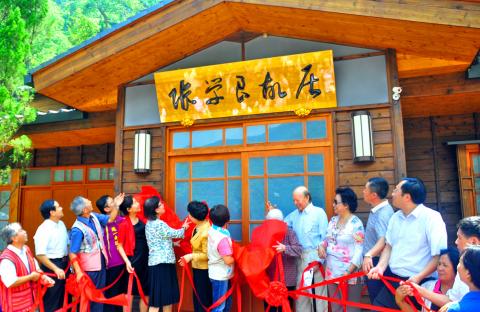The former residence of “Young Marshal” Chang Hsueh-liang (張學良), a key figure in modern Chinese history, was reopened to the public on Saturday after undergoing renovation, with a ribbon-cutting ceremony attended by his relatives in Hsinchu County’s Wufeng Township (五峰).
About 20 documents related to Chang’s daily life when he was in Wufeng, including photographs, newspaper clippings, copies of his manuscripts, letters and a special amnesty decree, have been put on display at the site, which was renovated at a cost of NT$47 million (US$1.55 million).
Chang, the son of warlord Chang Tso-lin (張作霖), played a key role in kidnapping Chiang Kai-shek (蔣介石) in 1936 in an effort to persuade Chiang to go all out against the Japanese troops who had invaded China, in what became known as the “Xian Incident.”

Photo: Tsai Meng-shang, Taipei Times
He wanted Chiang to form an anti-Japanese alliance with his Chinese Communist Party rivals instead of trying to eliminate them.
After negotiations and amid widespread public protests for Chiang to be released, Chang freed Chiang after two weeks.
Although Chiang’s Nationalist troops did later fight with the communists against the Japanese, Chang was court-martialed for insubordination and sentenced to 10 years in prison. Four days later, he was granted amnesty, but placed under “stringent supervision.”
Chang was kept under house arrest for 53 years, with Chiang ensuring that he was moved to Taiwan when the Chinese Nationalist Party government lost the Chinese Civil War and fled to the island in 1949.
Chang was sent to Wufeng, a mountainous township home mostly to Aborigines, where he was held until 1990, three years after martial law was lifted. Chang and his wife, Chao I-ti (趙一荻), moved to Hawaii in 1993, where he died in Honolulu in 2001, a year after his wife.
The Hsinchu County Government invited eight of Chang’s relatives, including his younger sister, Chang Huai-min (張懷敏), to Saturday’s ceremony.
During the ceremony, Chang Huai-min said the tour of Wufeng made her miss her brother. She said her brother was enthusiastic about photography and often took pictures of their relatives when he was in China. However, she had few opportunities to meet him and missed him a lot after she went to teach at Fu Jen Catholic University and National Taiwan Normal University.
The old house was almost destroyed by a typhoon in 1963 and has been restored to its original Japanese architectural style, a county government official said.
The building was first opened to the public in December 2008.

Taiwanese can file complaints with the Tourism Administration to report travel agencies if their activities caused termination of a person’s citizenship, Mainland Affairs Council Minister Chiu Chui-cheng (邱垂正) said yesterday, after a podcaster highlighted a case in which a person’s citizenship was canceled for receiving a single-use Chinese passport to enter Russia. The council is aware of incidents in which people who signed up through Chinese travel agencies for tours of Russia were told they could obtain Russian visas and fast-track border clearance, Chiu told reporters on the sidelines of an event in Taipei. However, the travel agencies actually applied

New measures aimed at making Taiwan more attractive to foreign professionals came into effect this month, the National Development Council said yesterday. Among the changes, international students at Taiwanese universities would be able to work in Taiwan without a work permit in the two years after they graduate, explainer materials provided by the council said. In addition, foreign nationals who graduated from one of the world’s top 200 universities within the past five years can also apply for a two-year open work permit. Previously, those graduates would have needed to apply for a work permit using point-based criteria or have a Taiwanese company

The Shilin District Prosecutors’ Office yesterday indicted two Taiwanese and issued a wanted notice for Pete Liu (劉作虎), founder of Shenzhen-based smartphone manufacturer OnePlus Technology Co (萬普拉斯科技), for allegedly contravening the Act Governing Relations Between the People of the Taiwan Area and the Mainland Area (臺灣地區與大陸地區人民關係條例) by poaching 70 engineers in Taiwan. Liu allegedly traveled to Taiwan at the end of 2014 and met with a Taiwanese man surnamed Lin (林) to discuss establishing a mobile software research and development (R&D) team in Taiwan, prosecutors said. Without approval from the government, Lin, following Liu’s instructions, recruited more than 70 software

Chinese spouse and influencer Guan Guan’s (關關) residency permit has been revoked for repeatedly posting pro-China videos that threaten national security, the National Immigration Agency confirmed today. Guan Guan has said many controversial statements in her videos posted to Douyin (抖音), including “the red flag will soon be painted all over Taiwan” and “Taiwan is an inseparable part of China,” and expressing hope for expedited reunification. The agency last year received multiple reports alleging that Guan Guan had advocated for armed reunification. After verifying the reports, the agency last month issued a notice requiring her to appear and explain her actions. Guan